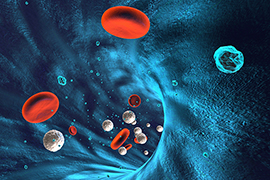
After stem cell transplantation, some people develop hard-to-treat anemia (low red blood cells) or thrombocytopenia (low platelets). Cytopenia(s) or low blood cell counts make you weak, prone to bleeding and bruising, and dependent on blood product transfusions. Researchers at the National Institutes of Health (NIH) are testing the drug fostamatinib to see if it is safe to treat cytopenia(s) after stem cell transplantation. A physician referral is not required to participate.
Who Is Eligible?
- People ages 18-75 years who are ≥ 60 days following an allogeneic transplant
- Transplant patients with low red blood cell or platelet counts (or both) who:
- Failed or relapsed after at least one line of therapy; and/or
- Remains transfusion-dependent (needing at least one transfusion per 2 wks.); and/or
- Are steroid-dependent
What Is Involved?
- A review of medical history to determine eligibility for the study
- Blood and laboratory tests
- Novel treatment and close follow up at the world-renowned NIH Clinical Center
All study-related visits, tests, and medication are at no cost. Travel within the United States may be reimbursed.
The NIH Clinical Center, America’s Research Hospital located in Bethesda, MD Metro red line (Medical Center stop).
For More Information
NIH Clinical Center
Office of Patient Recruitment
800-411-1222
TTY users dial 7-1-1
Email: ccopr@nih.gov
Or go online
Refer to study 000758-H
Department of Health and Human Services
National Institutes of Health Clinical Center (CC)
National Heart, Lung and Blood Institute (NHLBI)

